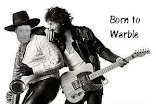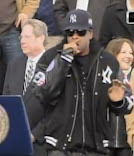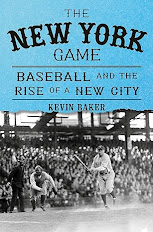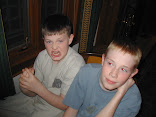All right, all right, all right.
This discussion over which Yankees should have their numbers retired has rolled on through one post and comments section after another.
Time to put my thoughts together on this. And if I repeat myself...well, as the poet wrote, "I am large/ I blather on."
Also, I realized I finished my last remarks on this without getting to the esteemed gentleman to the left.
We are, I think, all agree on the core immortals. To deal with the controversies:
1—Billy Martin. Absolutely NO. It's sad that no one got him help. But the man was a psychotic drunk, who ruined pitchers as routinely as most of us crunch potato chips. I try to pretend that that No. 1 out there is for Bobby Murcer, a beloved Yankee who died too soon, or the first man to wear the number for the Bombers, HOF centerfielder Earle Combs, a lifetime, .325 hitter and member of the great, 1927 Murderers' Row team.
2-5—Jeter, Ruth, Gehrig, DiMaggio. YES. If you have a problem with these...you have wandered onto this website by accident.
6—Joe Torre. YES. Sorry, gotta disagree with JM. No, he was never a great field manager. But he was an amazing clubhouse/press/George manager at a time when that was needed to keep the team from dissolving into madness.
7-8(8)—The Mick. Plus CATCHERS. YES and YES (YES). And the number so nice, they retired it twice. Once for Yogi, probably the best pitcher in the history of the game, and again for Bill Dickey, who was probably in the top three, and who tutored both Yogi and Elston Howard. Counting Dickey's cup of coffee with the 1928 team, he was on 9 pennant winners and 8 world champions.
9—Roger Maris. YES. Is he here mostly out of guilt? Yes—and what's wrong with that? The guy pulled off an amazing feat, for which he was booed and harassed. Then Ralph Houk ran him out of town because the Yanks' typically incompetent doc read his x-rays wrong, and Houk became convinced that Rajah was faking a broken hand. (And we got rid of Casey Stengel so we could keep that yutz at the helm? Oy.)
10—Phil Rizzuto. YES. One of the greatest fielding shortstops, with a 22.9 defensive WAR in just 12 1/2 seasons. A decent hitter with little power, but an expert bunter who stole 149 bases at a 72 % rate. Despite missing 3 prime years because of WW II, he was on 10 pennant winners and 8 world champions, and won an MVP in 1950.
What's more, The Scooter was a beloved team icon, with his long broadcasting career. Why, it could be said that he even made his commentating into a sort of...poetry.
13—Alex Rodriguez. NO. Someone proposed him for the future, but I say no. True, he helped bring us the last title of our lifetimes. And no, he wasn't the only one juicing, but he did, and he was a constant source of controversy and distraction.
Also...WAS he the Yanks' greatest right-handed hitter ever? I say no to that, too. In his 12 seasons in NY, he was a .283/.378/.523/.900 hitter, with 351 home runs, and 152 stolen bases. He also deserved several Gold Gloves he never got. And granted, we didn't get his 10 earliest—and many of his best—years in Seattle and Texas. (Lifetime figures: .295/.380/.550/.930)
But Joe, Joe DiMaggio was not only a lifetime .325/.398/.579/.977 with 361 home runs (and only 369 strikeouts), playing in the much more lopsided, O.G. Yankee Stadium. Lifetime, on the road, he had 213 homers, and went .334/.406/.611/1.016. He was also maybe the third greatest centerfielder, ever, and a very good runner, in a time when they didn't run.
AND...he not only missed 3 years thanks to the war, but had to put in 3 years in the PCL, then almost a major-league. In 1933, just 18, he hit .340 there and set the league consecutive-game-hit record. Still, before he was done, he was on 10 pennant winners and 9 world champions.
Joe D., yes. A-Rod, no. (And then, of course, there's that Judge guy...)
15—Thurman Munson. YES. Another victim of the Yanks' righty-penalizing Stadium. A GREAT fielding catcher—still surpassing the league pct. of runners thrown out even after some bad arm injuries—and a terrific clutch hitter, who became the first player in something like 30 years to hit over .300 and drive in over a hundred runs three straight seasons. The 1976 MVP, his lifetime stats in 30 postseason games were .357/.378/.496/.874.
16—Whitey Ford. YES. Until Clay Kershaw retired, he had THE lowest, lifetime ERA of any starting pitcher after the deadball era (2.75). It was even lower (2.71) as he rung up his record 10 wins—and a record scoreless inning streak—in the World Series. Won 1 Cy Young, and would've won 2, if they had been split by league then. Despite losing two years to military service, he went 236-106, and his winning pct. of .690 was even higher than his team's.
20, 21, 46, 51—Jorge, Paulie O'Neill, Pettitte, Bernie. The '90s "support crew." I say YES on all of them.
Jorge would be in the HOF if I-Rod hadn't been a juicer, the best catcher in the AL for at least 10 years. O'Neill was the fighting heart of the club, not only a great clutch hitter but the man who made that outfield grab to beat the Braves, 1-0. Bernie was near-HOF caliber; four-time Gold Glove winner, four-tool ballplayer who often suffered from what we thought he could be.
Pettitte...256 wins, and another 19 in the postseason, including 5 in the World Series. Could've run up even more for if noodnik Cashman hadn't let him walk to Houston for 3 years, and take another one off. What sticks in the craw somewhat is the juicing. But he was a damned clutch pitcher even before that started.
23—Don Mattingly. YES. A terrific player, whose career was cut short by injury. RBI, BA, and OPS titles in three different years. Nine Gold Gloves. Just could not hang on long enough.
32—Elston Howard. YES. First Black Yankee (Aside from the Black Yankees.) First Black AL MVP. Two Gold Gloves. Didn't make the team until he was 26 (hmm, wonder why...), and spent years backing up Yogi behind the plate, playing left field without a word of complaint. One of only 6 men to play in 10 or more World Series.
37—Casey Stengel. YES. An NYC icon. Won a record 10 pennants and a record-tying 7 world championships with the Yankees—and if not for injuries to Mantle in 1955 and 1957, the Braves cheating in 1957, and a terrible field in 1960, might have gone 10-10. A hugely skilled field manager—and beloved character. Unlike Joe McCarthy, he managed in a time when much of the AL had almost caught up to the Yanks in terms of personnel. He was the team's winning edge.
42—Mariano Rivera. YES. Get serious.
44—Reggie Jackson. YES. Yes, he created plenty of his own problems. And many more were created by his insane manager, and nearly insane owner. Amazing clutch player. From the 1977 World Series through the 1978 World Series, he had 9 home runs in 12 games, and ran up series OPSes of 1.792, 1.529, 1.196. Yanks would've won the 1981 World Series if Mad George hadn't ordered him sat for 3 of the 6 games.
49—Rod Guidry. YES. It was not just the amazing, 1978 season. He had two ERA titles, three, 20-win seasons, and would've had four and won two straight Cy Youngs if he had not volunteered to go to the bullpen in 1979, after Gossage got hurt. Record of 5-2, 3.02 in October, and would've been 6-1 and under 3.00 if Lemon had simply pulled him in time in 1981. He gutted out the 1978 playoff in Boston on short rest, without a word of complaint. And...he took care of Yogi when he was old.
52—CC. No. Love the guy. Didn't love that he didn't feel any obligation to get fit or get sober until after he finished pitching for us. But hey, it doesn't kill me that he'll be up there. Be well, CC.



























































